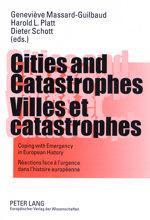Massard-Guilbaud, Geneviève, Harold L. Platt, and Dieter Schott, eds. Villes et catastrophes: Réactions face a l’urgence dans l’histoire européenne [Cities and Catastrophes: Coping with Emergency in European History]. Frankfurt am Main: Peter Lang, 2002. Studies about the effects of catastrophes such as earthquakes or floods contribute to the international quest to gain a better understanding of ways to reduce the tragic consequences of natural and human-made environmental disasters. The focus on such disastrous events also gives us a new historiographical perspective to understand the ways in which people organize their social life within urban society. The essays in this volume present this perspective in a convincing manner. Based upon papers given at a session at the 5th International Conference on Urban History in Berlin (2000), the essays within the book cover a wide geographical range of countries including France, Poland, Greece, Great Britain and its Caribbean colonies, Finland, Germany, and Italy. At the same time, the articles (presented with abstracts in English, French, and German) cover a wide range of urban disasters from floods and fires to earthquakes and epidemic diseases. The ten collected essays offer a good selection of cases through which to study the state of emergency when cities are faced with catastrophic events, including the impact of fires on towns in Finland at the beginning of the nineteenth century (by Marjatta Hietala), the Manchester floods as the result of the industrialization on nature (by Harold L. Platt), and the two earthquakes of Messina in 1783 and 1908 (by Michela D’Angelo and Marcello Sajia). Matthew Mulcahy shows, in his analysis of urban catastrophes in the eighteenth-century British Atlantic world, that disaster relief offered a useful measure of the extent to which the British Empire became a unified entity during that time. Dieter Schott analyses the ways in which the “Great Fire” of 1842 was remembered in Hamburg during the “Great Flood” of 1962. The volume clearly shows that in many cases catastrophes marked a major turning point in the history of a city. (Text adapted from an H-Net review by Michael Kempe.)
Villes et catastrophes: Réactions face a l'urgence dans l'histoire européenne
Massard-Guilbaud, Geneviève, Harold L. Platt, and Dieter Schott, eds | from Multimedia Library Collection:
Books & Profiles


